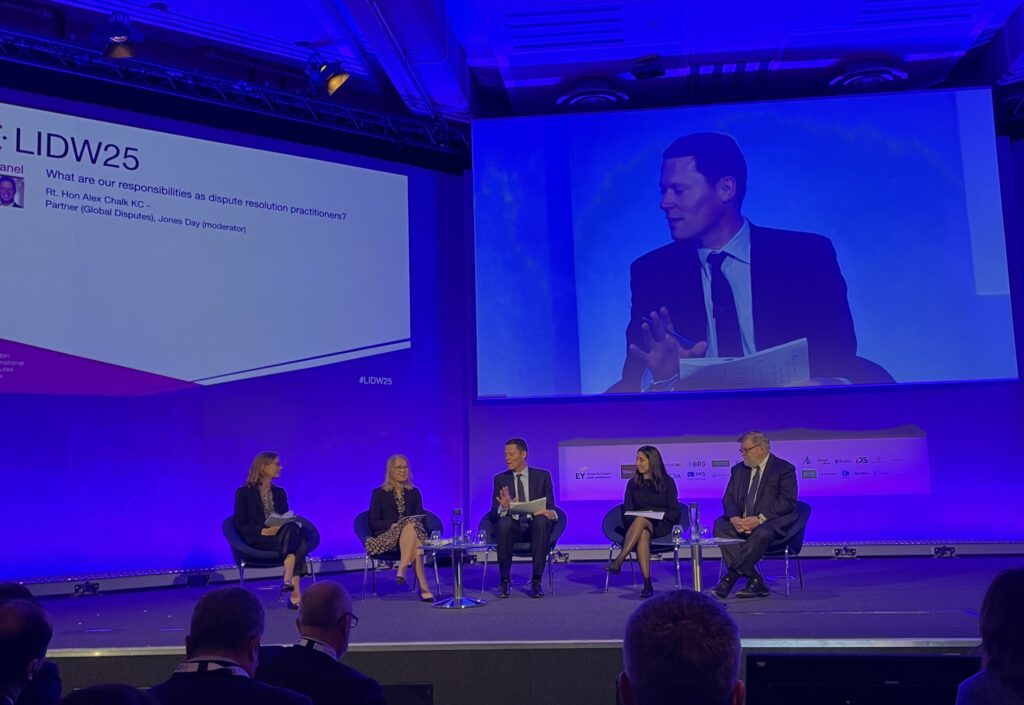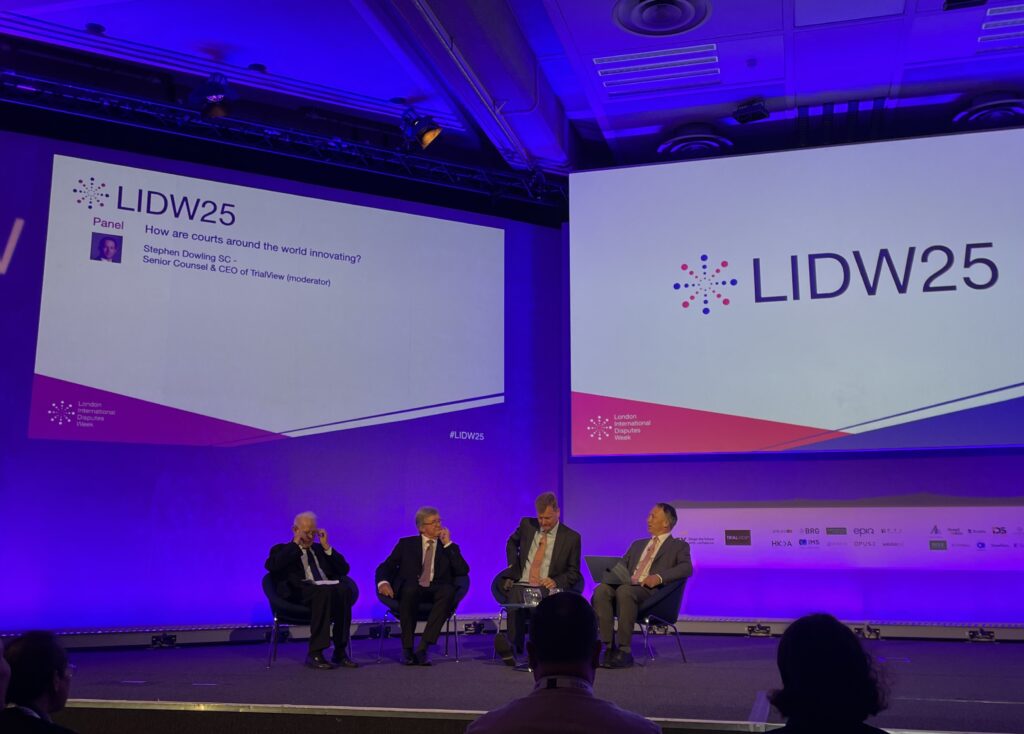The main conference of the London International Disputes Week (“LIDW”) 2025 was themed “Innovation in Dispute Resolution: Navigating Global Risks.” Throughout the day, practitioners from around the world gathered to explore how to navigate an increasingly fast-paced and ever-changing global landscape—and to reflect on the legal profession’s role and responsibilities in this new era.
Strong Foundations and Innovation to Elevate the Role of the UK as an International Dispute Resolution Hub
The main conference opened with a keynote address by Minister Sarah Sackman KC, reaffirming London’s status as a global hub for arbitration and dispute resolution. The Minister highlighted the diversity and calibre of practitioners, alongside the impartiality and independence of institutions, as key pillars of the robust legal system in England and Wales. However, she emphasised that in a rapidly evolving world, governments must adapt to retain their competitive edge. The new Arbitration Act 2025 exemplifies the UK’s commitment to staying at the forefront of legal innovation. Concluding her speech, Sackman underscored the UK’s responsibility to lead in shaping the future of international dispute resolution and to meet emerging challenges with confidence.
Geopolitical and Economic Shifts
The first panel set the tone for the main conference, exploring how evolving geopolitical and economic dynamics are reshaping the landscape of disputes. Moderated by Campbell Jackson (Ernst and Young), the panel featured Cherie Blair CBE, KC (Omnia Strategy LLP) and Dr Nigel Gould-Davies (International Institute for Strategic Studies).
Cherie Blair offered the perspective of an international lawyer, stressing the enduring importance of international law—particularly when domestic legal avenues are constrained by political factors. She argued that international law must remain a tool for fostering prosperity and predictability, rather than serving narrow state interests. To meet the demands of a changing world, she called for greater flexibility in legal instruments, especially in investor-State dispute settlement mechanisms, where current treaties often reflect imbalances that need redress.
Dr Nigel Gould-Davies brought a geopolitical lens to the discussion, noting that legal order reflects a balance of power and interests among States. International institutions help stabilise these dynamics by aligning around shared values. However, when those values erode and state intentions become unclear, uncertainty and instability return—reverting to a system driven by power struggles. He emphasised that power is ultimately constrained by reality, citing the U.S. tariff disputes as an example: even dominant States cannot unilaterally impose their will. This, he concluded, reinforces the need for diplomacy and mutual benefit in international legal relations.
Fireside Chat on the AI’s Role in Law and Disputes
Following the opening panel, James Besley (Google DeepMind) joined Gregory Mostyn (Wexler) for a fireside chat exploring the role of Artificial Intelligence (“AI”) in the legal system and dispute resolution. They addressed key challenges, particularly the risks of AI generating inaccurate or misleading content. They also highlighted AI’s transformative potential in areas such as drug discovery and climate change research. Both speakers agreed that, while the benefits are significant, legal practitioners must first develop a solid understanding of how to use AI responsibly and effectively.
Professional Duty v. Personal Values: A Variety of Perspectives

The second panel focused on the ethical responsibilities of dispute resolution practitioners, particularly the tension between professional duties and personal beliefs. The discussion was moderated by the Rt. Hon. Alex Chalk KC (Jones Day) and featured James E. Castello (Arbitration Chambers), Hana Abas (Cloisters Chambers), Adele Falconer (Christie’s), and Professor Joan Loughrey (Queen’s University Belfast).
James Castello highlighted a key challenge in international arbitration: the lack of international rules that could uniformalise counsel conduct. With practitioners operating under different national legal systems, expectations around professional behaviour can vary significantly, creating uncertainty in cross-border proceedings.
Hana Abas brought a labour law perspective, focusing on employees’ rights under English law to have their personal beliefs accommodated in the workplace. She noted that employers must balance these rights with the operational needs of their business.
Adele Falconer offered the in-house counsel’s viewpoint, explaining that her responsibilities differ from those in private practice. In-house lawyers often wear multiple hats and are more deeply involved in business decisions, which can blur the lines between legal and strategic roles. Regulatory obligations may also differ depending on jurisdiction.
Professor Joan Loughrey distinguished between defending a client’s legal rights and endorsing their actions. She argued that the core ethical question is not about whom a lawyer represents, but what actions they take on the client’s behalf—and whether those actions align with their professional duties.
Strengthening the International Dispute Resolution Toolkit
Judge Joan Donoghue, former President of the International Court of Justice, closed the morning session with a keynote address on how practitioners can collectively navigate the challenges posed by today’s unstable international landscape.
She began by reaffirming the enduring values and legacy of international dispute resolution institutions and frameworks—such as the LCIA, Paris Arbitration Centre, New York Convention, ICSID, UNCITRAL rules, and IBA guidelines. These, she noted, form a diverse and resilient ecosystem rooted in a plurality of legal traditions and cultures—tools that must be both protected and actively used. However, Judge Donoghue urged the audience to go further: not only to use these tools, but to “clean” and refine them. Drawing on a metaphor of a well-worn toolkit, she suggested that mechanisms like mediation and conciliation can serve as methods to enhance and modernise existing practices.
Finally, she emphasised the need to make the dispute resolution system truly international—not just by including practitioners from a wide range of jurisdictions, but by learning from legal traditions beyond the conventional North-Western paradigm. This, she argued, is essential to building a more inclusive and effective global system.
Building the Dispute Resolution Practice of the Future: Human Insight in the Age of AI
The first afternoon panel featured a discussion among law firm partners, in-house counsel, company directors, and vice presidents on the qualities expected of future legal professionals, particularly in light of AI’s growing influence. Moderated by William Peake (Harneys), the panel included Andrew Austin (Freshfields), Greg Harman (BRG), Natasha Harrison (Pallas Partners LLP), Fiona Meany (JLL), and Lorraine Medcraft (Epiq).
The conversation centred on the role of emerging technologies—especially AI—in dispute resolution. While AI offers powerful tools for research and efficiency, the panellists emphasised that certain human qualities remain irreplaceable. Skills such as critical thinking, nuanced understanding, and creative problem-solving cannot yet be replicated by machines. AI excels at processing data, but the true value of a legal professional lies in their ability to interpret, analyse, and innovate. Ultimately, the panel agreed that technology should enhance, not replace, human expertise—freeing professionals to focus on more complex tasks and personal wellbeing, including mental health.
Pro Bono, Access to Justice, and the Rule of Law: Strengthening Justice Through Service
Sharif A. Shivji KC (4 Stone Buildings) and Richard Jeens (Slaughter and May) offered valuable insights into the importance of pro bono work—particularly in upholding the rule of law, ensuring access to justice, and addressing gaps where public systems fall short.
Shivji emphasised that pro bono work benefits not only society but also lawyers themselves, both personally and professionally, regardless of seniority. Both speakers encouraged the audience to explore the pro bono initiatives of their respective firms.
Navigating Supply Chain Disputes & Risk: Strategies to Minimize and Face Arising Disputes from the Geopolitical Turmoil
Building on the morning’s opening panel, this panel focused on the challenges faced by clients in light of recent global events that have disrupted supply chain. The panel was moderated by Jeremy Wilson (Covington & Burling), featured Mr Justice Henshaw (Commercial Court of England & Wales), Richard Indge (Ankura), Natasha McCarthy (Debevoise & Plimpton LLP), and Marc Merrill (Uniper SE).
Jeremy Wilson noted the impact of COVID-19, the war in Ukraine, and global trade tensions—even on businesses not directly embedded in affected supply chains. Richard Indge added that ESG compliance and reputational concerns have also reshaped supplier relationships.
Mr Justice Henshaw stressed that many disputes arising from such disruptions could have been avoided with clearer contractual drafting. Natasha McCarthy agreed, highlighting the importance of well-defined provisions—particularly force majeure clauses tailored to the business’s specific commercial and geographical context. She also noted the need to clearly define terms like “reasonable endeavours” to reduce ambiguity.
From a commercial standpoint, Marc Merrill advocated for portfolio diversification to mitigate risk, ensuring that exposure in one contract is offset by more stable arrangements elsewhere—especially in the face of government intervention.
Mr Justice Henshaw concluded by suggesting that improved dispute resolution mechanisms, such as those offered by arbitral institutions like the LCIA (which allows for dispute consolidation) or GAFTA (which provides for concurrent hearings), could help manage the rise in supply chain-related disputes.
The View from Business with Lord Karan Bilimoria: Championing the UK Dispute Resolution System
Lord Karan Bilimoria CBE DL (International Chamber of Commerce (“ICC”) UK) joined Poonam Melwani KC (Quadrant Chambers) for an engaging conversation that brought energy and optimism to the audience. Drawing on his journey from law student to successful entrepreneur, Lord Bilimoria shared his perspective on the UK’s global standing in dispute resolution. He highlighted the country’s strong judicial reputation and the excellence of its legal professionals as key reasons why the UK remains a leading hub in this field. As Chairman of the ICC UK, he also noted that a significant proportion of practitioners involved in ICC arbitrations are qualified in England and Wales—further reinforcing the UK’s influence in international dispute resolution.
Celebrating Two Centuries of Justice, Diversity, and Excellence of the Law Society of England and Wales:
In celebration of the Law Society of England and Wales’ 200th anniversary, its President, Richard Atkinson, reaffirmed the Society’s enduring commitment to upholding the rule of law, ensuring access to justice, and promoting excellence within the legal profession. He emphasised the strength and richness of the legal community in England and Wales, which is marked by its diversity of backgrounds and jurisdictions. According to Atkinson, this diversity not only enriches the profession but also reinforces the UK’s appeal as a leading venue for international dispute resolution and a welcoming environment for practitioners from all jurisdictions.
From Tradition to Transformation: How Courts Are Embracing Change
The final panel brought together distinguished judges from various jurisdictions to explore how courts worldwide are embracing innovation—particularly through the integration of technologies such as AI.

Moderated by Stephen Dowling SC (TrialView), the panel featured Lord Justice Birss (Court of Appeal England and Wales), the Hon. Wayne Martin AC KC (Dubai International Financial Centre Courts), Judge Elizabeth S. Stong (U.S. Bankruptcy Court, Eastern District of New York), and the Rt Hon. the Lord Thomas of Cwmgiedd (Qatar International Court).
The panellists addressed ongoing challenges faced by judiciaries, notably the persistent lack of resources. Technology emerged as a key theme, with digital tools seen as vital to improving efficiency and expediting judicial processes. Examples included digital filing systems, smart forms that guide users through required fields, virtual hearings, and the use of AI.
However, the panellists were unanimous in cautioning that such technologies should serve to support—not replace—the analytical and interpretive work of legal professionals. The goal, they stressed, is to enhance access to justice and streamline procedures without compromising the integrity of judicial reasoning.
Conclusion
The overarching message of the day was clear: while we are navigating significant shifts in the global order and witnessing rapid technological advancements—particularly in AI—the international legal community continues to be anchored by shared values and principles. Such common foundations offer a sentiment of resilience, confidence, and unity that may guide us through turbulent times.
This post is part of Kluwer Arbitration Blog’s coverage of London International Disputes Week 2025.
________________________
To make sure you do not miss out on regular updates from the Kluwer Arbitration Blog, please subscribe here. To submit a proposal for a blog post, please consult our Editorial Guidelines.


